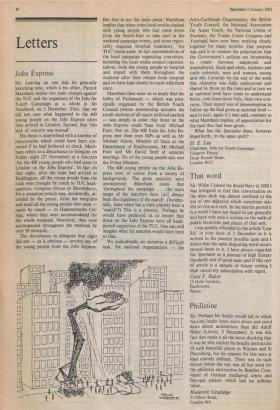Letters
Jobs Express
Sir: Leaving on one side his generally knocking tone, which is his affair, Patrick Marnham makes two main charges against the TUC and the organisers of the Jobs for Youth Campaign as a whole in his Notebook on 5 December. First, that we did not care what happened to the 400 young people on the Jobs Express when they arrived in London. Second, that 'this lack of concern was mutual'.
His thesis is intertwined with a number of inaccuracies which could have been cor- rected if he had bothered to check. Marn- ham refers to a disturbance in Islington on Friday night (27 November) at a function `for the 400 young people who had come to London on the Jobs Express'. In fact on that night, after the train had arrived at Paddington, all the young people from the train were brought by coach to TUC head- quarters, Congress House in Bloomsbury, for a reception (which was, incidentally, at- tended by the press). After the reception and meal all the young people then went again by coach — to Hammersmith Col- lege, where they were accommodated for the whole weekend. Moreover, they were accompanied throughout the weekend by over 50 stewards.
The disturbance in Islington that night did not — as is obvious — involve any of the young people from the Jobs Express. But that is not the main point. Marnham implies that when some local youths clashed with young people who had come down from the North-East to take part in the weekend campaign events, and some regret- tably required hospital treatment, 'the TUC' stood aside. In fact representatives of the local campaign organising committee, including the local trades council represen- tatives, took the young people to hospital and stayed with them throughout the weekend after their release from hospital and we have kept closely in touch with them since.
Marnham then went on to imply that the lobby of Parliament — which was prin- cipally organised by the British Youth Council (whose membership includes the youth sections of all major political parties) — was simply in order that those on the Jobs Express could 'hear from' Michael Foot. Not so. The 400 from the Jobs Ex- press met their own MPs as well as Mr Michael Alison, Minister of State at the Department of Employment, Mr Michael Foot and Mr David Steel at separate meetings. Six of the young people also met the Prime Minister.
The 400 young people on the Jobs Ex- press were of course from a variety of backgrounds. The great majority were unemployed; Marnham states that `throughout the campaign . . the main target of the marchers have [sic] always been the organisers of the march'. (Inciden- tally, since when has a train journey been a `march'?) This is a travesty. Perhaps he would have preferred us to ensure that those on the Jobs Express were all hand- picked supporters of the TUC. One can well imagine what his reaction would have been ..to that.
We undoubtedly set ourselves a difficult task. Six national organisations — the
Afro-Caribbean Organisation, the British Youth Council, the National Association for Asian Youth, the National Union of Students, the Trades Union Congress and Youthaid have now been working closely together for many months. Our purpose was and is to counter the polarisation that the Government's policies are threatening to create between employed and unemployed, black and white, students and trade unionists, men and women, young and old. Certainly by the end of the week this objective was fully understood and shared by those on the train and in turn we at national level have come to understand better, and share more fully, their own con- cerns. Their mood was of determination to follow up the lead given at national level and in part, again if I may add, contrary to what Marnham implies, of appreciation for the lead that had been given.
What has the Spectator done, however imperfectly, in the same spirit?
D. E. Lea
Chairman, Jobs for Youth Campaign, Congress House, Great Russell Street, London WC1


































 Previous page
Previous page